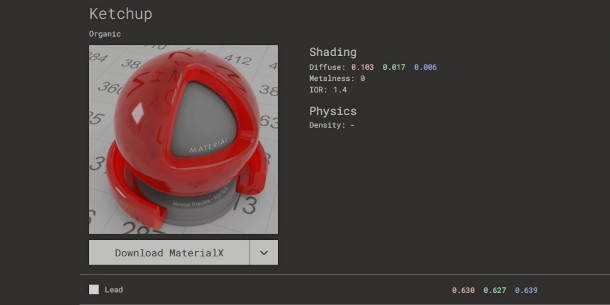Physically Based lists PBR values for real-world materials

Need to know the RGB colour of ketchup or the Kelvin temperature of moonlight? Try Physically Based.
Created by games artist Anton Palmqvist, the new open-source online database lists the physical properties of over 100 real-world materials, light sources and camera sensors.
The site – a must-bookmark for shading and look dev artists – provides the key data required to recreate common materials accurately in DCC applications, including Blender, Omniverse and Unreal Engine.
An invaluable database of real-world material data for VFX, game development and visualization
Although the physical properties of many real-world materials can be found online if you look hard enough, Physically Based collects all of the data together into a handy searchable database.
The materials section lists the RGB colour values – diffuse, reflection and refraction colours – of over 50 materials, along with PBR shading values like metalness, Index of Refraction (IOR) and density.
Games artists can also download MaterialX shader data for Unity and Unreal Engine.
The data spans an eclectic range of substances, including metals, plastics, water and ice, human skin, and even foods like honey, ketchup and cooking oil.
Lighting artists get the colour temperature and intensity of artificial and natural light types, including different times of day and weather conditions, and compositors get the sensor data for over 50 pro digital cameras.
Display values in the default units of common DCC apps, renderers and game engines
Drop-downs at the top of the list let you switch between sRGB Linear and ACEScg colour spaces, numerical or hexadecimal colour values, and photometric or radiometric light units.
It’s even possible to choose common DCC apps – including Arnold, Blender, OctaneRender, Omniverse, Redshift, Unity, Unreal Engine and V-Ray – and have the site display the data in their default units.
The site is also built on an open API, so if you want to contribute data for new materials, you can submit a pull request on GitHub.
